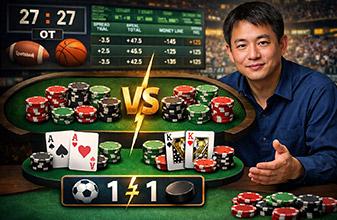More Tournament Craps Bets

Casino games tournaments are fun, and they can be profitable too. In upcoming articles, we will continue to publish a series of excerpts from Stanford Wong’s book, Casino Tournament Strategy.
Big 6 and Big 8
These are craps bets that the number will roll before a 7. A bet on the big 6 wins even money if a 6 rolls and loses if a 7 rolls. These bets give the casino 9.1%, so knowledgeable crapshooters would rather make place bets. Big 6 and big 8 bets have complete flexibility; you can make or remove them at will. At most casinos you can bet the big 6 and big 8 even if you have already placed those numbers for the maximum.
Buying Behind the Numbers
You can bet that a 7 will roll before a particular number. You do this by giving your bet to the dealer plus a 5% commission on the payoff. You get the true odds on your bet (except for the commission). For example, you can give the dealer $200 to put behind the 10 to win $100 if a 7 rolls before a 10. You also give the dealer $5 commission. Thus you either win a net of $95 or lose $205. Other names for this bet are “betting the 10 to lose” and “$200 no 10.”
You buy behind the 4 and 10 by putting up $200 to win $100, plus you pay the dealer a $5 commission. You buy behind the 5 and 9 with $150 to win $100 plus you pay the dealer a $5 commission. You buy behind the 6 and 8 with $120 to win $100 plus you give the dealer a 5% commission.
Buying behind numbers has complete flexibility. If you take these bets down the commission is returned to you.
Placing to Lose
Some books on how to play craps mention “placing to lose” as being the opposite of a place bet, just like buying behind a number is the opposite of buying the number. However, I have yet to find a casino that would allow me to place a number to lose.
Field
A field bet wins if the next roll of the dice is 2, 3, 4, 9, 10, 11, or 12. If the next roll is 5, 6, 7, or 8, the field bet loses. In some casinos 2 and 12 both pay double in the field; in other casinos, one of those numbers pays double and the other pays triple. If both pay double, the casino edge on field bets is 5.6%; if one pays double and the other pays triple, the casino edge is 2.8%.
The field bet is a one-roll bet; the next roll of the dice will decide the field bet for certain. And you have complete flexibility with field bets; you can make them or remove them as is your pleasure.
Propositions
Other bets are called proposition bets. Most of them give the casino a fairly healthy percentage, which is why the dealers sometimes hustle the customers to make them. The payouts, and thus the casino’s edge, vary from casino to casino. You can bet that the next roll of the dice is 2. Or 3. Or 11. Or 12.
Or you can bet on any other two-dice combination. This is called a hop bet. If you toss a chip onto the layout and say “4-3 on the hop,” you will win the same as the payoff on 11 — fourteen or fifteen times your bet — if the next roll of the dice is 4-3, and you will lose your bet if the next roll is not 4-3. If you bet a pair on the hop, such as 4-4, the payoff is the same as if you win a bet on 12.
Or you can bet on any craps; or any 7.
Or you can bet the hard ways. A bet on hard 8 is an example. If 4-4 rolls, this bet wins. If 2-6, 3-5, or any 7 rolls, this bet loses.
What Bets to Make and When
Upcoming articles will explain which of these bets to use and when you use them, going from your first bet up until the final ten minutes or ten rolls.
This article is part of a series, to be continued…
Excerpted with permission from Casino Tournament Strategy by Stanford Wong, edited for this format.











Please log in or register to leave a comment